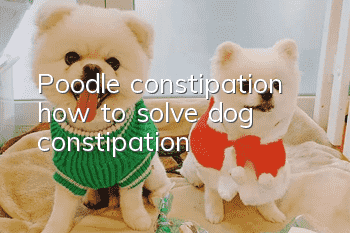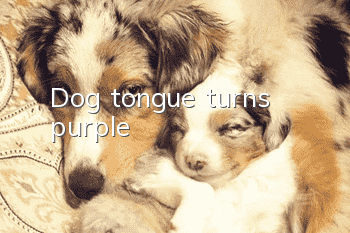Poodle constipation, how to solve dog constipation

When you find that your dog has reduced defecation frequency, the feces it excretes is quite hard, or it is difficult to defecate, it means that your dog is constipated. There are many reasons for dog constipation, and corresponding prevention and treatment measures also require attention to many details. If you want to have one-to-one detailed consultation on your dog's condition, you can contact Douchai consultant WeChat douchai144 to get detailed solutions for free.
1. Causes of constipation in dogs:
1. Malnutrition and chronic wasting diseases cause the dog's intestinal flaccidity, inability to transport intestinal contents, and retention in the intestines.
2. The feed is mixed with bones, hair, or heterophilic tinea, and they usually eat sand, soil and other debris.
3. Changes in the living environment have disrupted the dog’s original defecation habits.
4. Suffering from anal abscess, anal fistula, rectal tumor and other diseases.
5. Intussusception, intestinal hernia, pelvic fracture, prostatic hypertrophy, etc.
6. Drug factors, taking atropine, calcium carbonate, barium sulfate and other drugs.
There are many other causes of dog constipation. You can add WeChat douchai144 to get a detailed free consultation with a professional pet doctor
2. Clinical symptoms of canine constipation:
Based on the medical history, clinical manifestations and rectal or abdominal palpation, the diagnosis can be made if dry and hard feces can be felt and the dog often shows pain when pressed.
1. The main symptom is difficulty in defecation. Sick dogs often try to defecate, but cannot do so, and often bark in pain.
2. At the beginning of the disease, there are great changes in energy and appetite, followed by mental restlessness and inability to eat.
3. Bowel sounds weaken or stop, persistent vomiting, anal finger pressure allergy, bowel sounds weaken or stop, accompanied by symptoms of dehydration and rapid breathing. Dry, hard feces may be palpable in the rectum.
3. Prevention and treatment measures for canine constipation:
Depending on the condition of your dog's constipation, it can be treated with oral laxatives, enemas, or surgery.
1. For primary constipation, it mainly clears the intestines and promotes defecation. You can use warm soapy water, glycerin or liquid paraffin (5~30ml) for enema. However, when enema, the pressure should not be too high, otherwise it may easily cause perforation of the rectal wall. Take laxatives, such as 5 to 30 grams of sodium sulfate (or magnesium sulfate), 200 ml of normal water, once. For mild constipation, taking some honey orally can often achieve better results.
2. Dogs that do not respond to enema and drug treatment should undergo abdominal incision to remove the feces.
3. For secondary constipation, the primary disease must be mainly treated.
4. After the feces is clear, it is advisable to exercise appropriately, prepare feed reasonably, and provide sufficient drinking water.
If you would like one-to-one consultation on your dog’s condition, please feel free to contact usQuickly contact a professional pet doctor for free answers. Add Douchai consultant WeChat douchai144 to provide detailed solutions for free.
- What should I do if my puppy is picky?
- What to do if your dog catches a cold? You need to know this!
- What should I do if my dog sheds a lot of hair in winter?
- How to feed Pekingese puppies
- How to train Border Collie, several common training methods for Border Collie!
- How to train an English Springer Spaniel? Give them more rewards and support!
- Shiba Inu personality and appearance characteristics
- Why are dogs afraid of going to pet stores? It may be due to these reasons!
- What to do and how to get rid of bad breath in dogs
- What's going on when your dog keeps spinning in circles?



